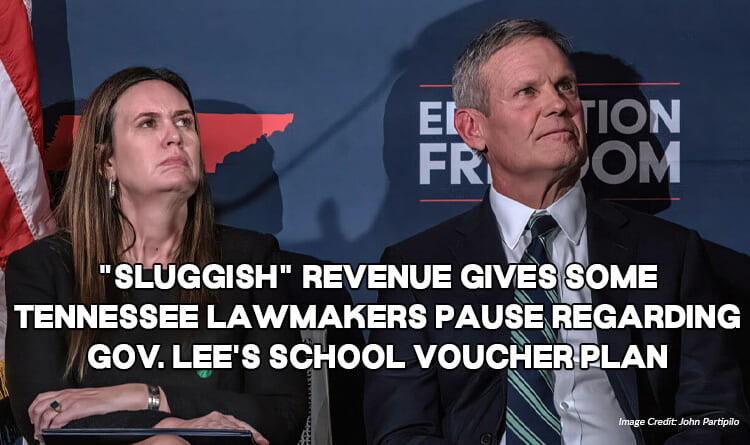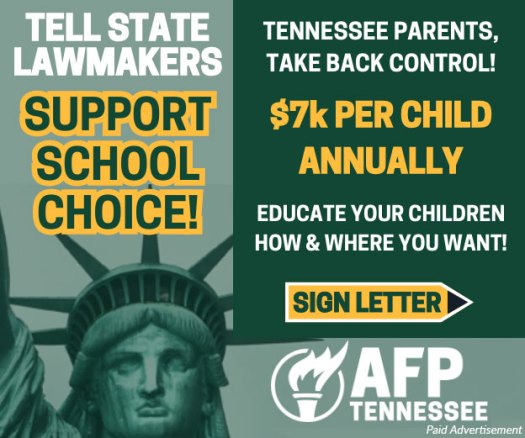Lawmakers wary of cost for sending students to private schools.
Photo: Gov. Bill Lee with Arkansas Gov. Sarah Huckabee Sanders in Nashville on Nov. 28, 2023, for Lee’s announcement he will push to provide private school vouchers statewide. Photo Credit: John Partipilo
By Sam Stockard [Tennessee Lookout -CC BY-NC-ND 4.0] –
Facing a $610 million budget shortfall and potential business tax cut, some lawmakers are leery of enacting Gov. Bill Lee’s entire private-school voucher proposal.
House Education Administration Committee Chairman Mark White told the Tennessee Lookout the expense of Lee’s plan is a “big concern.” Vouchers could be provided for up to 20,000 students in the program’s first year, based on the state funding it takes for students to attend public schools, about $6,000 to $7,000, putting the total cost at $120 million to $140 million.
“If we’re going to get something passed, it’s probably going to have to have a lot of changes, negotiations, and that would be one of the things that will probably have to be talked (about),” White, an East Memphis Republican, said recently.
Tax revenues are $610 million short of projections this fiscal year, and the Lee administration is proposing a $1.2 billion franchise tax rebate because of “significant risk of a legal threat,” on top of tax breaks passed last year.
Lawmakers are waiting to see the governor’s final bill, though a version was released Monday, giving some temporary political cover as they walk a tightrope between pro-choice education groups who would battle them politically and school district officials who oppose the governor’s idea to provide the “scholarships” for private school enrollment.
House Republican leaders, including Speaker Cameron Sexton, say they expect the money to be available to fund the governor’s proposal.
Privately, though, some Republican legislators say Lee is making them “walk the plank,” especially rural lawmakers whose school districts are the largest employers in their counties.
Lee unveiled his “Education Freedom Scholarship” plan in late 2023 and despite sluggish business tax collections and a push to rewrite the state’s franchise tax, he said last week Tennessee can pass the private-school voucher plan and continue to support public schools.
The governor contends the state’s revenue is 40% higher than it was just before the COVID-19 pandemic hit in 2020. Yet business tax reductions have caused revenue to come in lower than projected.
“The state’s economy is very strong. Our revenues are very strong,” Lee said. “We have significantly more dollars coming into the state in revenue than we had just three years ago.”
The governor said the state will invest “significantly” more this coming year for public education than for “education scholarships.”
“We can do both because it’s a priority,” Lee said.
Under a version of the governor’s bill released Monday, 10,000 students from families at 300% of the poverty rate would be accepted, and another 10,000 without income restrictions would be accepted.
White, however, said he is more amenable to the model for Tennessee’s Education Savings Account program, which is based on income, than a universal plan. About 2,100 students who qualify based on income in Metro Nashville, Shelby County and Hamilton County school districts receive roughly $9,200 to enroll in private schools.
The program was narrowly adopted in 2019 and went through an extensive legal battle before the Tennessee Supreme ruled that it didn’t violate the state’s Home Rule Amendment, which requires laws targeting one or two cities to be approved locally.
Senate Finance Committee Chairman Bo Watson, who has been warning lawmakers about sluggish revenue for months, is holding out until the governor presents his budget next week in the State of the State address before making a statement on the private-school voucher plan.

The Hixson Republican said a number of senators support the governor’s proposal. But he pointed out “we’ve gotta figure out how it gets paid for, and at this stage it’s their responsibility” to come up with a plan for funding it.
Democratic Rep. Caleb Hemmer, D-Nashville, has an array of questions about the governor’s idea, especially in light of the state’s budget situation.
Hemmer noted that locales such as Rutherford County are figuring out how to close large holes in their budget for school needs to keep up with growth.
County leaders have been seeking approval for impact fee legislation to limit the impact of new home construction on property taxes. Local governments also could see restraints placed on their ability to raise property taxes.
“We can’t help them out at the state, but somehow we can afford these new voucher schemes that are coming out,” Hemmer said.

About the Author: Sam Stockard is a veteran Tennessee reporter and editor, having written for the Daily News Journal in Murfreesboro, where he served as lead editor when the paper won an award for being the state’s best Sunday newspaper two years in a row. He has led the Capitol Hill bureau for The Daily Memphian. His awards include Best Single Editorial from the Tennessee Press Association. Follow Stockard on Twitter @StockardSam



